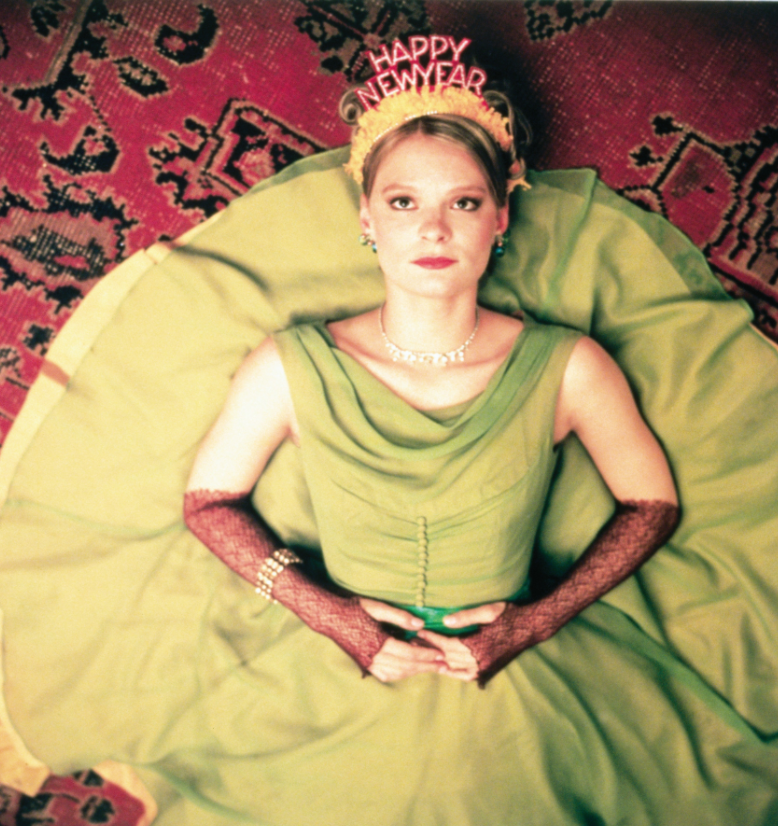Martha Plimpton is known for few film roles beyond that of Stef Steinbrenner in The Goonies, later transitioning more primarily to theater and Broadway work and therefore to less mainstream movies in the 90s like Mary Harron’s I Shot Andy Warhol (and yes, Lili Taylor played a far superior Valerie Solanas to Lena Dunham). One could also argue that Risa Bramon Garcia’s 200 Cigarettes (the only screenplay Shana Larsen ever got out into the world) was of the independent bent, not developing a cult following until after its theatrical release in 1999 (strangely in February instead of December).
At the forefront of cultivating its longstanding charm is Plimpton as Monica, the hostess of a New Year’s Eve party driving the entire narrative that she increasingly feels no one is going to show up to. With only one friend, Hillary (Catherine Kellner) and one ex-boyfriend, Eric (Brian McCardie), in attendance at her East Village apartment, Monica gradually starts to lose her mind/will to continue into 1982, yelling at Eric as she’s about to finally snap with every minute that ticks further toward midnight. She froths, “Look, I’m sorry that what’s-her-face dumped you, okay? And I’m sorry that you’re so bad in bed. I really am. But most of all, I’m sorry that I decided to throw this atrocity, this nightmarish ordeal of a New Year’s party because this is breaking me, Eric. Do you understand me? This party is breaking me. Nnhh! When Eric assures, “You don’t have to get so emotional. I mean, it’s not that bad,” Monica seethes, “It’s not that bad? It’s not that bad? Eric, we are standing here with one hostess who’s on the verge of hysteria and one guest…one guest…who spent the entire evening coming to terms with his sexual problems, OK? That’s it! That’s my party! Happy fucking New Year!”
At the core of this exchange is the very real fact that no one understands Monica or where she and her anxieties/insecurities are coming from. To everyone else, she’s merely “overreacting,” unable to see the crippling sense of rejection she must endure as a result of attempting to be social, when, as the universe likes to remind us, it’s almost always the kiss of self-esteem’s death–even in the 80s when internet wasn’t available as a perpetual distraction. As her apprehension and restlessness mount, her only remaining guest leaves, promising to return later. This sends Monica over the edge, harkening back to her foreshadowing at the beginning of the film, “You know, I hate parties. I hate going to them, and I hate giving them. At least when I’m going to them, I’m not responsible for how horrible they are. And this one’s gonna be the worst. I can feel it. No one’s coming. No… No… The losers will be here. All the people I hate will be here. All my ex-boyfriends and their new, more-attractive girlfriends will be here. Throwing a party…it’s like…it’s like an invitation for abuse. It’s like the last desperate act of someone who hasn’t had a lasting relationship since junior high.”
Left to her own devices, Monica has nothing to console herself with except vodka and the only thing that seems to be on the TV, Love Story–the worst possible movie to watch for a single on New Year’s. Screaming, “I hate you motherfuckers” at Ryan O’Neal and Ali MacGraw, Monica begins to lose any faint glimmers of hope while, on the outside world, all of her guests are still, in actuality, wrangling themselves together amid varying personal obstacles and circumstances. And doesn’t this speak to the very crux of self-doubt? Not being able to place faith in other people’s ability not to judge and condemn you for who you are? For Monica, the sentiment that to try at all is to be met with crushing disappointment is only further proven by her attempt to host this party. The masochism implied by her decision to go ahead and throw one anyway is a comment on the majority of humankind’s need to be met with the approval of those they little care about (like Morrissey said, “In my life, why do I give valuable time to people who don’t care if I live or die?”). So concerned with outside perception, Monica’s self-hating inner tape recording is allowed to thrive. And there is no one in her apartment to negate it otherwise, especially since Hillary and Eric are now in the deep throes of initial flirting conversation. Making the fatal mistake of preoccupying herself with the quantity of people at her party (not that the quality is really there either), Monica falls further into the sinkhole of depression that prevents her from meeting the love of her life, Elvis Costello, who is quite taken with the appetizer dip she made when he arrives later that night.
Does it all just go to show that if those of us insecure ilk would wait it out a little longer, the seemingly false platitude about good things coming to those who are patient enough would actually come to fruition? Perhaps the answer can be found in Monica’s effort at finding a silver lining in her misfortune, remarking upon waking to the wreckage of the morning, “At least I don’t have to spend the rest of my life thinking I have no friends and everybody hates me. Right That’s something, right?” But even in the insistence of that question lies the self-doubt that us of the Monica sistren can’t shake. In spite of her overt fabulousness–those sheer black lace evening gloves, that not quite lime green cocktail dress–Charles Bukowski assessed the syndrome of the diffident best in noting, “The problem with the world is that the intelligent people are full of doubts, while the stupid ones are full of confidence.”




















